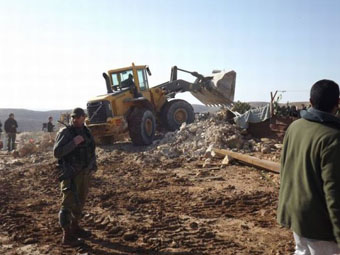 Imagine for a second if an Arab nation seized Israeli land and drove the Jewish inhabitants off into exile. Imagine what the world press’s reaction would be. Imagine if Britain seized control of a Jewish neighborhood in London and drove the Jews into exile. Imagine what the world’s reaction would be.
Imagine for a second if an Arab nation seized Israeli land and drove the Jewish inhabitants off into exile. Imagine what the world press’s reaction would be. Imagine if Britain seized control of a Jewish neighborhood in London and drove the Jews into exile. Imagine what the world’s reaction would be.
There would be an explosion of outrage, hate, venom and vilification. There would be calls for international military intervention to “stop the genocide” and visions of the Holocaust would be everywhere.
Yet the Zionist supremacists who control Israel have done exactly that to the Palestinians—and not “recently” either.
Last week, in fact, the Palestinian village of Susiya, in the Palestinian West Bank, were the subject of a seizure and demolition order by the Jewish state.
One single media report of the incident, which was ignored by all the major news networks (who instead focused on another obvious fake “hate crime” in Brooklyn, New York), reported that “demolition orders distributed last week by the Israelis aim to destroy virtually the entire village.”
There are however, some possible complications, as outlined in the article:
“Before it does, Israel could encounter an international complication: Several European countries, with traditional Israel ally Germany in the lead, have funded solar panels, wind turbines and wells to make life in area villages more bearable. A diplomatic incident may loom.
“They are turning us into refugees on our own land,” said resident Mohammed Nawaja, principal of a 35-student elementary school that consists of four tents slated for removal.
Susiya is one of more than a dozen “unrecognized” Palestinian herding communities in the southern West Bank, a desert-like area close to the Green Line, Israel’s pre-1967 war frontier with the West Bank, when it was ruled by Jordan. Its 160-odd residents live in shacks, caves and tents with cement-reinforced walls.
Israeli authorities say the structures are unlicensed. Residents and their supporters say Israel refuses to grant permits as part of a plan to clear the area for future territorial claims.
Activists say Israeli authorities have issued demolition orders in most of the hamlets over the years, but Susiya faces the most immediate risk of wholesale razing.
At the heart of the matter is the struggle over the 62 percent of the West Bank that remains under full Israeli control — known as Area C.
This area is home to more than 300,000 Jewish settlers, more than double the number of Palestinians living there. More than 90 percent of the West Bank’s Palestinians live in the parts of territory adding up to 38 percent of the land, administered by the Palestinian Authority.
The division results from the 1990s autonomy agreements between Israel and the Palestine Liberation Organization. They were meant to be temporary and lead to a final deal on drawing the borders of a Palestinian state more than a decade ago.
Negotiations repeatedly broke down, while the patchwork of jurisdictions in the West Bank remained.
Critics say Israel has blocked virtually all Palestinian development in Area C, while expanding the Jewish settlements there. Only 5 percent of Palestinian requests for building permits in Area C have been granted in recent years.
Planning restrictions and demolition orders are part of a wider Israeli land grab, said Michael Sfard, an attorney for Israeli activists who have installed solar panels and wind turbines with German funding in 18 small communities in the southern West Bank.
The Palestinians, who want a state in the West Bank, Gaza and east Jerusalem — territories Israel captured in the 1967 war — refuse to resume talks until Israel freezes settlement construction on occupied lands.
Since Israel did not recognize the community, it was not hooked up to electricity or water grids, while the settlement of Susiya and several unauthorized Jewish outposts in the area receive such services, said Sfard.
In 2010, Israel’s government designated the Susiya excavation area as a Jewish heritage site and promised funding to turn it into a major tourist attraction. Susiya residents say they’ve been barred from visiting the site, even though some were born there.
Israeli archaeologist Yonathan Mizrahi, who was not involved in the dig, said excavations also yielded remnants of a mosque built atop the synagogue in later years, but that this is not mentioned to visitors. “There is a clear political agenda, to legitimize the settlement (of Susiya) as continuing the Jewish presence of the past,” he said.
Last week, Civil Administration inspectors distributed demolition orders for several dozen structures in the village, including the school, a makeshift clinic, residential tents, animal shelters and German-funded solar panels, Assad said.



